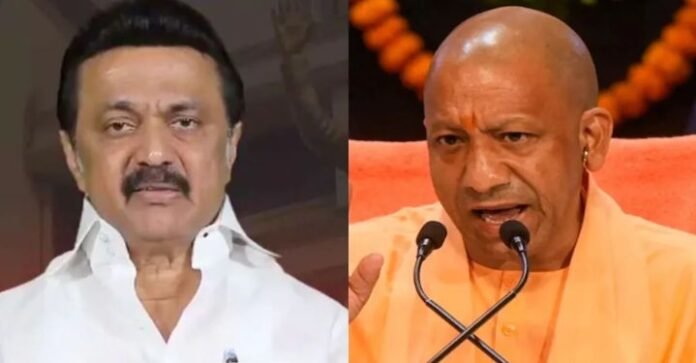In recent weeks, Tamil Nadu Chief Minister MK Stalin and Uttar Pradesh CM Yogi Adityanath found themselves in a heated verbal confrontation, as political tensions escalated across the nation. This exchange of barbs not only took on a regional tone but also revealed deeper ideological divides that transcend local state politics. Stalin, often known for his eloquent speeches and measured responses, did not hesitate to offer a sharp retort to Yogi Adityanath’s remarks, setting the stage for a dramatic political showdown.
Background of the Dispute
The roots of this political disagreement can be traced back to a speech made by Yogi Adityanath, where he criticized the governance of opposition-led states, particularly Tamil Nadu, pointing to what he claimed were issues of governance and corruption. Yogi’s comments were met with swift condemnation from various political figures, including Stalin, who saw these remarks as both unjust and politically motivated.
Yogi’s assertion that states ruled by opposition parties were lacking in development and were rife with corruption became the trigger for Stalin’s firm rebuttal. Speaking from his base in Tamil Nadu, Stalin aimed to not only defend his government’s achievements but also challenge the very premise of Yogi’s claims.
Stalin’s Response: A Masterclass in Political Strategy
MK Stalin’s reply to Yogi Adityanath’s barbs was nothing short of masterful. His response was not just a defense of his administration; it was a sharp critique of Yogi’s own tenure and the state of governance under the Bharatiya Janata Party (BJP). Stalin wasted no time addressing the accusations leveled against his government, pointing out the stark contrast between Tamil Nadu’s progress and the situation in Uttar Pradesh.
Stalin highlighted his state’s achievements, from social welfare programs to infrastructural growth, while Yogi’s Uttar Pradesh, according to him, was grappling with issues of law and order, communal tensions, and poverty. He accused the BJP of using divisive politics to cover up its failures in governance. His rhetoric resonated with many who were frustrated by the BJP’s centralization of power and its controversial policies.
Regionalism vs. Nationalism
One of the more significant aspects of this exchange was the clash between the regional and nationalistic ideologies. Yogi Adityanath, representing the BJP’s nationalist rhetoric, often speaks about the importance of strong centralized leadership. On the other hand, MK Stalin is a staunch advocate of federalism, emphasizing the autonomy of states in determining their own paths toward progress. This ideological divide was laid bare as the two leaders locked horns.
Stalin’s response was framed within the context of Tamil pride and autonomy, stressing that the state’s welfare policies were tailored to the unique needs of its people, and that such strategies could not be dictated by the central government. He argued that the BJP’s attempts to impose a one-size-fits-all approach on diverse states like Tamil Nadu were doomed to fail.
The Role of Media and Public Opinion
The media played a crucial role in amplifying this political exchange, with both leaders using press conferences and interviews to sway public opinion. Stalin’s calm yet pointed rebuttals were in sharp contrast to the more aggressive tone of Adityanath’s statements. As the controversy snowballed, the national media became the battleground for the war of words, with both sides attempting to frame the narrative in their favor.
Stalin’s ability to leverage his position as the leader of the Dravida Munnetra Kazhagam (DMK) also helped him secure the backing of many regional leaders and activists who viewed his stance as a defense of federalism and regional autonomy. For his part, Yogi’s statements were interpreted as an attempt to assert the dominance of the central government, a position that many critics saw as detrimental to India’s democratic fabric.
Conclusion
The exchange between MK Stalin and Yogi Adityanath exemplifies the ongoing battle between regionalism and nationalism in Indian politics. Stalin’s reply was a powerful reminder of the importance of federalism and the role of state governments in shaping India’s political landscape. Whether this conflict will lead to greater political polarization or inspire a more nuanced discussion on governance and federalism remains to be seen. However, one thing is certain: the rivalry between these two leaders is far from over.

